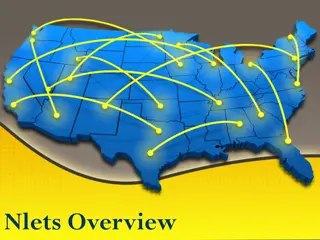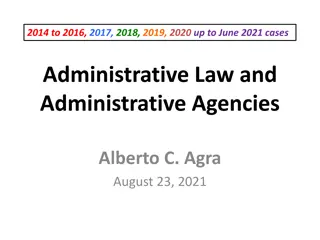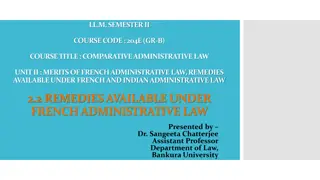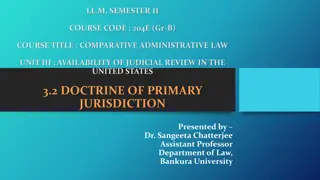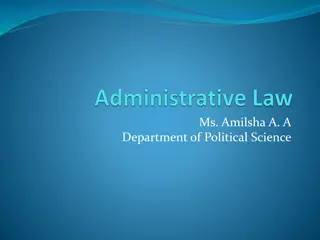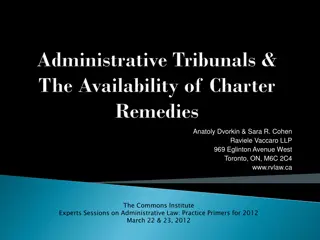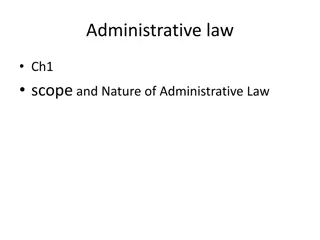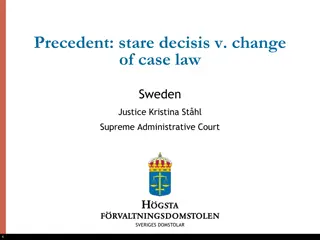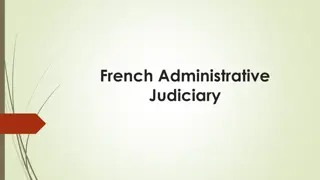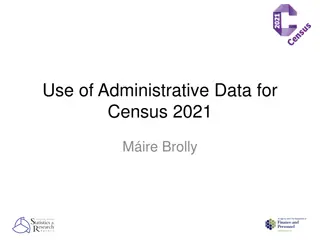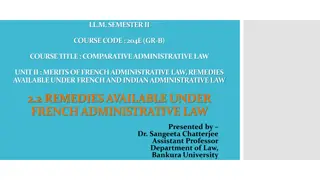Understanding Administrative Law and Administrative Agencies: A Comprehensive Overview
Administrative law encompasses the regulations governing government administrative agencies, outlining their organization and operations. This includes classifications, roles of administrative agencies, creation process, and examples of creating authorities like Congress, the President, and the Supreme Court.
Download Presentation

Please find below an Image/Link to download the presentation.
The content on the website is provided AS IS for your information and personal use only. It may not be sold, licensed, or shared on other websites without obtaining consent from the author. Download presentation by click this link. If you encounter any issues during the download, it is possible that the publisher has removed the file from their server.
E N D
Presentation Transcript
2014 to 2016, 2017, 2018, 2019, 2020 up to June 2021 cases Administrative Law and Administrative Agencies Alberto C. Agra January 31, 2022
Administrative Law o Definition: All the laws and policies that regulate or control the administrative organization and operations of the government through administrative agencies (AAs) o Classifications: 1. Internal and External Administration 2. Law that Controls (Charter) and those issued by Administrative Agencies (Rules) 3. Substantive and Procedural Administrative Law 4. General and Special Administrative Law 5. Geographical and Functional Jurisdiction Administrative Law Reviewer, Agra 2
Administrative Agencies (AAs) o An agency which exercises some significant form or combination of executive, legislative or judicial powers ( 4thBranch ) o All AAs are Public Offices o AAs are Delegates o Include boards, commissions, departments, bureaus, offices, authorities, government corporations, government instrumentalities, and local governments o Rationale: complex, diverse and specialized concerns Administrative Law Reviewer, Agra 3
Administrative Agencies (AAs) 4thBranch Public Offices Legal Persons Delegates/ Agents/ Subordinates Duty-Bearers/ Accountable Institutions Fusion of Powers 4
Creation of AAs o Constitution o Congress (Special Law-Chartered; GOCCs - economically viable and common good; LGUs law then plebiscite) o President (Executive Order; by authority under the Constitution or of law) o Supreme Court (classifies; confirms; invalidates) o AAs themselves (Articles of Incorporation and By- Laws; by authority of law; non-chartered) o Local Governments (Ordinance; by authority of law) Administrative Law Reviewer, Agra 5
Creation of AAs Creating Authority Voters Enabling Instrument Constitution Examples Commission on Elections Congress Special Law Social Security System President Executive Order Presidential Anti- Corruption Commission Administrative Agencies Local Governments AIBL PNOC-Renewables Corporation Cebu Property Ventures Dev t Corp. Ordinance; AIBL Administrative Law Reviewer, Agra 6
Charter: Enabling Instrument 1. Name 2. Principles 3. Mandate/ Purpose 4. Powers 5. Duties and Responsibilities 6. Relationships 7. Jurisdiction (can provide exclusions) 8. Structure 9. Budget 10. Dissolution Differentiator Administrative Law Reviewer, Agra 7
Characteristics of AAs 1. Size 2. Specialization/ Functions 3. Territory 4. Responsibility for Results 5. Administrative Duties 6. Delegated Authorities 7. Accountability 8. Relationships 9. Capitalization/ Funding (Stocks, if any) Administrative Law Reviewer, Agra 8
AA Categories Creation oConstitution oCongress oExecutive oAA themselves Geographical oNational: NGAs oLocal: LGUs Capital Structure oGOCC oGI Functional o Offers gratuities, grants or privileges o Performs specific governmental functions o Undertakes public service o Regulates businesses affected with public interest o Exercises police power to regulate private businesses o Resolves controversies 9
Government Bureaucracy o State Universities and Colleges o Public Corporation o Public Office o National Government Agency o Quasi-Corporation o Quasi-Public Corporation o Municipal Corporation Proper/ Local Government Unit o Quasi-Municipal Corporation o Administrative Agency/ Government Agency o Government-Owned and - Controlled Corporation o special charter/ parent o non-chartered under Corporation Code/ subsidiary o Government Instrumentality with Corporate Powers o Government Financial Institution Administrative Law Reviewer, Agra 10
GOCC vs. GICP GOCC 1. Organized as stock or non- stock corporation 2. Created by law or under Corporation Code 3. Public character of its function 4. Government directly or indirectly owns or controls at least a majority or 51% share of the capital stock 5. Created for common good and must be economically viable GICP 1. Neither stock nor non-stock 2. Not a corporation 3. Created by law only (not under Corporation Code) 4. Agency of the national government 5. Not integrated within the department framework 6. Vested with special functions or jurisdiction by law 7. Endowed with some if not all corporate powers 8. Administering special funds 9. Enjoying operational autonomy 10. Need not be economically viable Administrative Law Reviewer, Agra 11
GOCC vs. GI GOCC GI Created by Special Law Created under Corp Code Governmental Function Common Good Economic Viability Corporate Powers Stocks divided into Shares Non-Stock Administrative Law Reviewer, Agra 12
Recent Jurisprudence Entity Characterization Manila Int l Airport Authority (GI) Created under an Executive Order GI; not a GOCC since neither stock nor non-stock Manila Economic and Cultural Office (Not GOCC; Not GI) Created under Corporation Code as non-stock corporation Not a GOCC (not owned by Government); Not a GI (since incorporated under Corporation Code) Sui Generis Funds subject to COA Boy Scouts of the Philippines (GI and GOCC) Created as corporation under Special Law (Commonwealth Act) Juridical person under Civil Code (other corporations with public purpose) Public function - vital role of the youth GOCC and GI attached agency; need not meet twin test (economic viability and control/ ownership test) - Sui Generis Veterans Federation of the Philippines (GOCC) Created under RA 2640 and registered with the SEC Public corporation per Charter; Adjunct of government; Classified as GOCC to be privatized Sovereign function; Control and supervision of DND; DBM can in the future allocate funds Administrative Law Reviewer, Agra 13
Recent Jurisprudence Entity Characterization Philippine Fisheries Dev t Authority (GI) Created under PD 977 as amended by EO 772 GI; not a GOCC (has capital stock, but not divided into shares) Leyte Metropolitan Water District (GOCC) Created pursuant to PD 198 GOCC with an original charter (since not under Corporation Code, not a private corporation) Quasi-Public under Charter Philippine Economic Zone Authority (GI) GI since not integrated within the department framework but is an agency attached to the DTI Philippine Reclamation Authority (GI) Incorporated GI Not a GOCC since not a stock nor a non-stock corporation; has capital stock but not divided into shares Not a GOCC since while established for common good, it need not meet test of economic viability nor compete in market place Metropolitan Waterworks and Sewerage System (GI; GOCC ) GI under Executive (EO 596-2006) and Legislative (GCG Law) By its nature, it is a GOCC (stock corporation; meets common good and economic viability tests) Bureau of Local Government Finance (DOF) Not an AA whose findings on questions of fact are given weight and deference in the courts since only provide consultative services and technical assistance to LGUs Administrative Law Reviewer, Agra 14
Recent Jurisprudence Entity Characterization Bases Conversion Development Authority (GI) Not stock: Capitol stock not divided into shares Not non-stock: not organized under list purposes under Corp. Code As GI, exempt from paying legal or docket fees Exempt from Creditable Withholding Tax on the sale of its properties Corregidor Foundation (GOCC) Non-stock corporation organized under Corporation Code Has public interest, to maintain and preserve the war relics Government has substantial participation in the selection of governing board; has control over Foundation GOCC Under COA Audit University of the Philippines (GI) GI under its Charter Tax exemption pertains to assets owned by UP (not extend to assets owned by lessee of UP land) Philippine International Convention Center (GOCC) Incorporated under PD 520; sole stockholder is Bangko Sentral ng Pilipinas Non-Chartered GOCC, subsidiary of BSP Subject to COA Philippine National Construction Corporation (GOCC) GOCC under supervision of President Subject to COA Administrative Law Reviewer, Agra 15
Summary Structure Stocks AA Create Function Gov t Class Effect RPT MIAA EO Airport Owned owned GI GOCC/ GI MECO SEC/CC Trade, Fees Non-stock COA BSP Law Youth Attached GOCC/ GI COA VFP Law/ SEC Veterans Adjunct (PC/ GOCC) DND RPT Stocks PFDA PD Fisheries GI WD PD Water GOCC COA PEZA Law Eco. Zones Attached GI DTI Stocks RPT/ Y RPT/ Y Docket PRA PD Reclamation Control Inc. GI MWSS PD Water Stocks Stocks (GOCC)/ GI BCDA Law Bases GI Corr. SEC/ CC Relics Non-stock Control GOCC COA RPT UP Law Education GI PICC PD/ CC Convention Stocks Subsidiary GOCC COA/ BSP PNCC CC Construction Stocks Supervise GOCC COA Administrative Law Reviewer, Agra 16
Rules 1. All AAs are POs, not all POs are AAs (e.g. Congress, Courts) 2. All AAs are GAs, All GAs are AAs (under GCG Act) 3. All PCs are AAs, not all AAs are PCs (e.g. Departments, GIs and Commissions) 4. GOCCs are Corporations, GIs are not; GOCCs cannot be GIs (except BSP) 5. GOCCs, not GIs, must meet twin constitutional test of common good and economic viability 6. There are chartered (special law) and non-chartered GOCCs (Corporation Code) Administrative Law Reviewer, Agra 17
Rules 7. All Quasi-Corporations are GOCCs, All GOCCs are Quasi- Corporations; GIs are not QCs since they are not corporations 8. GOCC-GI distinction matters: a. Local taxation (GIs exempt PFDA, MIAA, PRA, MWSS, UP) b. Legal/ docket fees (GIs exempt BCDA) and Commissioners Fees (Land Bank since performing governmental function related to agrarian reform) c. COA jurisdiction (subject to COA BSP, WD, MECO, Corregidor, PICC, PNCC) d. Relationship either attachment, control or supervision (VFP control and supervision; and BSP, PRA, PEZA attached; PNCC supervision; Corregidor - control) Administrative Law Reviewer, Agra 18
Administrative Relationship o Areas: policies, rules, actions, operations, budget, decisions, day-to-day, policy and program coordination o Types: 1. Independent/ Autonomous (e.g. Commission on Elections) 2. Control and Supervision (e.g. President and DOTr, PRA; Mayor over Department Heads) 3. Administrative Supervision (e.g. Province over Component City/ Municipality) 4. Attachment (e.g. DENR and LLDA; DOF and SSS; the approval or disapproval of the DBM Secretary, sitting as ex officio officer as required under the law would not have the effect of one member of the board overturning the votes of the majority of the board since it is, by legal fiat, actually the act of the President exercised through his alter ego; Doctrine of qualified political agency does not attach to the acts performed by cabinet secretaries in connection with their position as ex officio members of an AA) Administrative Law Reviewer, Agra 19
Spectrum of Interference COA CSC COMELEC Ombudsman ERC o Change decision o Modify choices o Overrule o Clip discretion o Discipline o Preside over Board o 1 vote in Board o Require reports President over LGUs Control Supervision Attachment Autonomous o Oversee and monitor o Declare acts illegal o Cannot change choices o Discipline President over IATF/ NGAs/ Some GOCCs- GIs NGAs in GOCC/ GI Boards o Functional o Fiscal 20
Power of Higher over Lower to Control Supervision Attachment Alter-ego Substitute judgment Overrule discretionary acts Change wisdom-based decision Impose rules on how to act Revise policy/ rules Discipline Declare acts illegal/ ultra vires Declare acts improper/ arbitrary Declare acts prejudicial to public welfare Review contracts on legal matters Require periodic reports Oversee to ensure actions legal Vote and Membership in Board Veto/ disapprove decisions of Boards Participate in day-to-day operations Administrative Law Reviewer, Agra 21
Powers o AAs possess Delegated, not Inherent, Powers o Subordinate, not Superior to/ above Enabling Instrument/ Charter, Laws (set boundaries/ limit powers/ define jurisdiction) o In general, liberal, not strict, interpretation of powers o AAs cannot prohibit what law does not prohibit (unless LGU, provided no law is violated) o Basic Powers 1. Investigative 2. Rule-Making or Quasi-Legislative 3. Adjudicative or Quasi-Judicial Administrative Law Reviewer, Agra 22
Powers Delegated (not inherent) Subordinate Legislation Mandate- Driven Liberal Interpretation 23
Exercise of Powers Ministerial (duty to do a particular thing in a particular way) Discretionary (decide or act according to one s judgment) Mandatory (requirements must be followed and non- observance is not excusable) Directory (non-compliance with requirement is excusable) 24
Must be Expressed in Enabling Law General: 1. What law is 2. Relationship 3. Prohibitory Powers 4. Jurisdiction Investigation: 5. Contempt 6. Subpoena 7. Search and Seizure Quasi-Legislation: 8. Contingent Rule 9. Penal Rule Quasi-Judicial: 10.Quasi-Judicial 11.Enforcement of Decisions 12.Resolve questions of law Administrative Law Reviewer, Agra 25
Delegation of Powers o Potestas delegata non potest delegari o Exceptions: o President tariff and emergency o Local Governments o People s Initiative o Administrative Agencies o Tests of Valid Delegation: 1. Completeness (the what , rights; even if formulate plan under Cybercrime Law); and 2. Sufficient Standards (may be broad, such as public order, safety, social justice, quality of education, law and order under definition of Cybersecurity ; genuine local development; but not vague; may be stated in separate law) Administrative Law Reviewer, Agra 26
Twin Tests of Valid Delegation 1. Completeness and o sets forth therein the policy to be executed, carried out, or implemented by the delegate (delegate will just enforce) 2. Sufficient Standard o provides adequate guidelines or limitations in the law to map out the boundaries of the delegate s authority and prevent the delegation from running riot o specifies the limits of the delegate s authority, announces the legislative policy, and identifies the conditions under which it is to be implemented Administrative Law Reviewer, Agra 27
Menu of AA Powers Investigate- Protect-Compel Administrative/ Executive Quasi- Legislative Others/ Corporate Quasi-Judicial Police Power 28
Investigate-Protect-Compel Express/ Implied in Charter o Cease and Desist o Withdrawal of Privilege Delegated by Law o Preventive Suspension o Abatement of Nuisance Preventive/ Protective Coercive/ Penal Informational Express/ Implied in Charter o Fact-Finding o Clearance o Ocular Inspection o Visitorial o Investigate anomalies o File cases Delegated by Law o Contempt o Subpoena o Search & Seizure 29
Cease and Desist Orders Depending on Charter/ law: o Mandate/ purpose of AA defines object of CDO o Power can be express or implied o Can be an incident of administrative or quasi- judicial proceedings o Can be done motu proprio, ex parte or after notice and hearing (pre- or post-issuance) o Observe pre-conditions (e.g. show cause order) o Subject to administrative reversal and/ or judicial review 30
Investigative Powers (IP) o partakes of judicial discretion, not judicial function o Express or Implied 1. Clearance 2. Fact-Finding 3. Ocular Inspection 4. Visitorial 5. Create committee to investigate 6. Investigate anomalies (CSC) Comelec can cite a person for indirect contempt for non- appearance (implied from constitutional power to IP, CHOPFE and enforce laws) o Express Grant 1. Contempt (can be adjunct of IP, if law provides; not exclusive to courts) Subpoena (enabling law needed; not implied from IP) Search and Seizure (If not delegated, apply before courts (Presence of counsel not required) 2. 3. Administrative Law Reviewer, Agra 31
Law vs. Rule Law (Congress/ LGUs) o Why of law (purpose/ policy)? o Who covered (not covered)? o What are: o Scope? Boundaries? Limitations? Exclusions? o Classes? Categories? o Acts? Rights? o Duties? Responsibilities? o Obligations? Requirements? o Standards? Conditions? o Offenses? Penalties? o When take effect? Rule (AAs) o How implemented? o What are details? o When statutory provisions become operative (if parameter/ condition in law)? 32
Rule-Making o Definition: Power to Issue Rules/ Fill in details/ How (not What ) a Law will be implemented; means to provide direct and efficacious solutions to problems o Nature: Laws are controlling and cannot be amended by a rule; Subordinate Legislation, i.e., Inferior/ must not be inconsistent with the Constitution, Laws and Charter, i.e., cannot change, amend or be in conflict with; test of valid exercise of subordinate legislation 1. Germane to objects and purposes of law 2. Regulation not contradict and must conform with law o Rationale: regulation highly complex, future situations cannot be fully anticipated, practicability, expediency and expertise Administrative Law Reviewer, Agra 33
Rule-Making 1. Rules partake of the nature of a statute Force and effect of law (but are not laws) Interpretations persuasive (deserves cogent consideration); not controlling upon courts (courts must apply the rules if validity of rules not put in issue) Presumed legal and constitutional Mandatory to issue rules if shall used in enabling law 6. 7. Operative effect Must be followed by other AAs; cannot postpone the application (DOE Rules by ERC) Rules of an AA may be used as basis for rules of another AA Subject to judicial review 10. Subject to repeal and amendment 11. Prospective application 2. 3. 8. 9. 4. 5. Administrative Law Reviewer, Agra 34
Rule-Making Requisites 1. Authority: by authority of law (DOJ has no authority to issue a circular on HDO which curtails right to travel absent an enabling law; not fall within inherent power of DOJ to issue rules) 2. Nature: Executive (not legislative - Congress cannot limit or take over the President's power to adopt IRR for a law it has enacted; if issued by the President, power is self-executory by virtue of its being inherently executive in nature; falls under Faithful Execution Clause) Administrative Law Reviewer, Agra 35
Rule-Making 3. 4. 5. Substance: not contrary to law (subordinate legislation) Scope: germane to the objects and purposes of the law Procedure: properly promulgated; publication and hearing, if required by law (Circular/ not Administrative Regulation [internal rule] so not require hearing, publication and consultation) Issuer: Issued by proper authority for assigned subject matter/ within its jurisdiction (FDA can issue circular based on AO of SoH; CSC cannot issue rules on positions exempt from classification since outside jurisdiction; Career Executive Service Board (CESB) is expressly empowered to promulgate rules, standards and procedures on the selection, classification, compensation and career development of the members of the CES) 6. Administrative Law Reviewer, Agra 36
Dos and Donts/ Can and Cannot Dos/ Can Don ts/ Cannot Issue rules to implement laws Enact/ amend/ repeal laws Prescribe the how and provide details Define the who,why, what, when Use or apply rules of other AAs Not follow or postpone the implementation of rules of other AAs o Issue rules outside of its mandate o Refuse to issue rules if directed by statute Issue rules as directed by law Issue supplementary, interpretative, internal and procedural rule based on express or implied authority Issue contingent and penal rules absent express authority Issue internal and interpretative rules without publication Issue supplementary, contingent, penal and procedural rule without publication Administrative Law Reviewer, Agra 37
Rule-Making Standard: Reasonableness o Relation to purpose; germane to the objects and purposes of the law o Supported by good reasons o Not arbitrary o Free from legal infirmities Administrative Law Reviewer, Agra 38
Rule Defined Rule means any agency statement of general applicability that implements or interprets a law, fixes and describes the procedures in, or practice requirements of, an agency, including its regulations. The term includes memoranda or statements concerning the internal administration or management of an agency not affecting the rights of, or procedure available to, the public. [Section 2 (2), Chapter 1, Book VIII, Revised Administrative Code] Administrative Law Reviewer, Agra 39
6 Types of Rules Supplementary/ Implementing Procedural Penal Interpretative/ Opinions Contingent Internal 40
Rules Defined Supplementary Supplies the details, implements and supplements the law, and governs the public. Procedural Outlines the procedures and remedies. Contingent Determines the existence of a fact which is specified and defined in the law, and operationalizes said statutory provision. Penal Provides for the conditions and penalties for the violation of rules as expressly allowed under the law. States the official position or opinion of the AA. Interpretative Internal Governs the administration and operations of a particular AA or other AAs. Administrative Law Reviewer, Agra 41
Types of Rules (PIPICS) Type Grant Publication Supplementary/ Implementing Interpretative Express (E) or Implied (I) E or I Required Not Required Contingent E Required Penal E Required Procedural E or I Required Internal E or I Not Required Administrative Law Reviewer, Agra 42
Ordinance-Making Powers President o Executive Order (general or permanent character; must be published) o Administrative Order (aspects of government operations) o Proclamation (dates or declare status; must be published) o Memorandum Order (administrative detail, concerns particular officer) o Memorandum Circular (internal administration for all/ some agencies) o General or Special Order (as commander-in-chief) Local Governments o Territorial Application o Sanggunian-enacted and Governor/ Mayor-approved o More or less permanent in character o Ordinances and Resolutions Administrative Law Reviewer, Agra 43
Examples of Rules Supplementary Providing incentives to all government and private Health Institutions with Breastfeeding Practices Interpretative Issuing guidelines on treatment of discounts extended by power suppliers Procedural Outlining the procedure for the disqualification of nuisance candidates Penal Setting the penalties for violation of rules Penalty of P1,000.00 per day for repeated defiance of its final and executory judgment is reasonable and fair in relation to the purpose of preserving the CSC's Constitutional mandate Contingent Lowering the National Tax Allotment of LGUs on the basis of a declaration of an unmanageable public sector deficit Internal Disallowing release of retirement benefits to those with pending cases Administrative Law Reviewer, Agra 44
Rule-Making: Valid Rules Law Rules AA decision final after 15 days appeal to OP within 30 days procedure allowed but silent on period provide for 60 days control and supervision require reports DAR to CA DAR to OP to CA exclusive authority to investigate withheld right to examine and cross-examine during investigations prescribe competition determine eligibility of bidders provide for termination of OFW employment determine causes and factors provides exception to transferability of agricultural land subject to regulations recognized rule on succession and implemented owner-cultivator policy in agricultural development CSC constitutional mandate imposed penalty of P1,000.00 per day for repeated defiance of its final and executory judgment Not give power to legislate (MMDA) adopt number coding-scheme is rule-making Law excludes heinous crimes from benefit Inclusion of heinous crime in exception Administrative Law Reviewer, Agra 45
Rule-Making: Invalid Rules Law Rules both provident/ retirement and housing benefits superior to those not cumulative 10 years from payment provident and/or employee-housing vacation leave and sick leave shall be cumulative 2 years from payment appeal 15 days 10 days illegitimate children may use name of father shall use from only 1 source provide additional allowances enumerate fixed list of benefits added benefits provides exception lists requirements for creation of provinces qualifications fixed for elective officials added drug test classify and mark tobacco exclusive sources
Rule-Making: Invalid Rules Law Rules develop road programs regulates promotion of milk declare roads - limited access ban certain aspects academic freedom ban review classes state insofar as it concerns their individual franchise or right to exist as such entity state/general public or other entity campaign airtime limit per medium airtime limit for all stations ElectronicData Message abortifacient butnot limited to primarily incluces abortion not prohibit electro-fishing prohibit electro-fishing silent on fixing fines fixed fines
Rule-Making: Invalid Rules Law Rules prescribe minimum standards for law admission require passing of test otherwise law schools cannot admit increase awareness among lawyers prescribe mandatory training for lawyers implement Salary Standardization Law revise salary grades election at next election after effectivity of law upcoming election where election period started power to issue rules create substantial distinctions between types of contractors exempted under the Charter to fix compensation fix compensation contrary to applicable law shall allow end-users to the contestable market mandatory migration to market (application needed; transfer is not automatic) other benefits wage-related benefits Administrative Law Reviewer, Agra 48
Rule-Making: Invalid Exercise Law Creates Rule Abolishes Strict Requirements Liberalizes Requirements No Requirement Stated Requirement Imposes Requirement Alters/ Deletes Requirement Enumeration Exclusive Adds/ Deletes Requirement No Classification Discriminates/ Classifies Limited Application Expands Application Broad Application Abridging Application Fixed Period Continue Practice Grant Power Changes Period Discontinues Practice Nullifies Power Administrative Law Reviewer, Agra 49
12 Rules on Rule-Making 1. Executive in nature 2. Force and effect of law and must be followed 3. Subordinate legislation 4. Presumed valid 5. Issued by authority of law 6. Subject within jurisdiction/ authority 7. Notice and hearing not required (unless law requires and material change) 8. Pass reasonableness test 9. Operative upon publication 10. Prospective in application 11. Subject to repeal and amendment (unless vested or contractual rights involved) 12. Subject to judicial review (unless business judgment) 50






